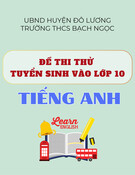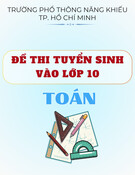
ÔN THI VÀO L P 10 MÔN TI NG ANHỚ Ế
Topic 1: Pronunciation and stress.
NG ÂMỮ
1. NGUYÊN ÂM: VOWEL
a. Nguyên âm đn:ơ (vowel) Có 12 nguyên âm:
/ i: /- read, see, meet, meal / i /- sit, six, hit
/u: / - too, two, pool, school / u / - book, put, could
/ / - ǝago, porter, apartment / / - lɜearn, first, word
/ : / - sɔaw, nor, sort / / - nɔot, hot, got
/ / - bʌut, umbrella, come / a: / - part, arm, farm, car
/ e / - men, hen, lend / æ / - man, hat, batman
b. Nguyên âm đôi: (Diphthong)
/ i / - hǝere, near, fear / ei / - name, came, page
/ / - tʊǝ our, poor, jury / i / - bɔoy, coin, enjoy
/ / - gǝʊ o, cold, load / e / - wǝear, care, hair
/ ai / - nice, fine, rice / a / - hʊow, cow, house, now
2. PH ÂM (CONSONANT)Ụ
/ b / - bus, but, band / p / - put, pen, pitch
/ k / - candy, cook, can / d / - day, deep, dance
/ t / - take, turtle, tornado / g / - get, goal, goat, go
/ s / - soon, sun, sound / z / - rise, music, prize
/ / - ʃsugar, sure, chef / ʒ / - measure, pleasure, vision
/ t / - quesʃtion, chips, church / d / - ʒjoy, age, large
/ f / - fine, laugh, enough / v / - heavy, veal, move
/ w / - win, whale, one / j / - your, yet, use
/ h / - head, who, hand / / - θthank, thin, teeth
/ ð / - this, they, father / m / - mother, my, mountain
/ n / - nowadays, net, beneath / ŋ / - sing, thank, thing
/ l / - long, lie, lifelong / r / - red, wrong, proud
ÂM CÂM TRONG TI NG ANH ( ph n 1)Ế ầ
Âm B câm: Âm B là m t âm câm khi nó đng cu i t và đng tr c nó là âm ộ ứ ố ừ ứ ướ M.
- climb [klaim] : leo trèo - comb [koum] : cái l cượ
Âm C câm: Âm C là m t âm câm trong c m "ộ ụ scle" cu i t .ở ố ừ
muscle ['m sl] : c b pʌ ơ ắ
Âm D câm: Âm D là m t âm câm khi nó đng li n v i âm ộ ứ ề ớ N.
Wednesday ['wenzdei] : th 4ứ
Âm E câm: Âm E là m t âm câm khi đng cu i t .ộ ứ ố ừ
- hope [houp] : hi v ngọ - write [rait] : vi tế
1

Âm G câm: Âm G là m t âm câm khi đng tr c âm ộ ứ ướ N.
foreign ['f rin]: n c ngoàiɔ ướ
Âm GH câm: Âm GH là m t âm câm khi đng tr c âm ộ ứ ướ T ho c đng cu i t .ặ ứ ố ừ
- daughter ['d :t ] : con gáiɔ ə - light [lait] : ánh sáng
Âm K câm: Âm K là m t âm câm khi đng tr c âm ộ ứ ướ N đu.ở ầ
- knife [naif] : con dao - know [nou] : bi tế
Âm H câm: Âm H là m t âm câm khi đng sau âm ộ ứ W. tr Who/ Whom/ Whoseừ
- what [w t] : cái gìɔ - when [wen] : khi nào
where/why : đâu/t i saoở ạ
Ngo i l :ạ ệ M t s t b t đu b ng âm ộ ố ừ ắ ầ ằ H câm s đc dùng v i m o t “ẽ ượ ớ ạ ừ an”.
- hour ['au ] : giə ờ - heir [e ] : ng i th a kə ườ ừ ế
CÁCH ĐÁNH D U TR NG ÂMẤ Ọ
1. Nh ng danh t và tính tữ ừ ừ có 2 âm ti tế thì tr ng âm th ng r i vào âm ti t ọ ườ ơ ế th nh tứ ấ .
Ex: kitchen, active…
Nh ng đng tữ ộ ừ có 2 âm ti tế thì tr ng âm th ng r i vào âm ti t ọ ườ ơ ế th 2ứ tr nh ng âm có ừ ữ
cách đc ng n nh : ọ ắ ư - er, - el, - ow,
Ex: accept, begin…
Tr : cừlever, travel, borrow….
2. Nh ng danh t và đng t ữ ừ ộ ừ có 3 âm ti tế thì tr ng âm th ng r i vào âm ti t ọ ườ ơ ế th nh tứ ấ
n u âm cu i ế ố cùng đc dàiọ.
Ex: company, interest, …
Nh ng danh t và đng t có ữ ừ ộ ừ 3 âm ti tế thì tr ng âm th ng r i vào ọ ườ ơ âm ti t th 2ế ứ n u âm ế
cu i cùng đc ng n nh : ố ọ ắ ư er, el, ow, ic, op…
Ex: discover, tomorrow….
3. Khi g p các h u tặ ậ ố: -ic, -ical, -aphy, -ogy, -ity, -acy, -ian, -id, -ible, -ish, -ial, - age, -
ure, - ety, - ion, - ous, - ior, - iar, - ence, - iency, - ient, - ier, - ict, -ent: thì tr ng âm r i vào ọ ơ
âm ti t tr c các h u t nàyế ướ ậ ố .
Ex: economic economical succession suggestion photography
Biology ability democracy musician stupid
Possible childish confidential (kín đáo) democracy
structure dictation librarian experience premier relict (qu ph )ả ụ
image society artificial superior efficiency
republic mathematics courageous familiar convenient
Ngo¹i trõ : cathonic (toàn di n) ệlunatic Arabic politics arithmetic (s h c) vacố ọ ate
(b tr ng)ỏ ố
4. Khi g p các t ghép: ặ ừ
T ghép là danh t : - tr ng âm r i vào ch đu: VD: - ừ ừ ọ ơ ữ ầ school-bag
2

T ghép là đng t và tính t : - tr ng âm r i vào ch th 2: VD: - under-ừ ộ ừ ừ ọ ơ ữ ứ stand, old-
fashioned, homesick airsick …
Nh ng : ư bad- temper short- sighted well- informed upstairs
well - done short- handed north- east down- stream
well - dressed ill - treated downstairs north - west ...
5. Các t có từ ừ 3 âm ti tế tr lên thì tr ng âm r i vào âm ti t th 3 tính t “ph i” qua “trái”ở ọ ơ ế ứ ừ ả
VD: opportunity, geography, familiar,…
L u ý:ư
1. - Các ti n t và h u t không nh h ng đn tr ng âm c a t : ề ố ậ ố ả ưở ế ọ ủ ừ -re- , dis-, un-, in-, il-, im-,
ir-, -ness, -ous, -able, -d, -en, -ful, -less, -ing, -ment, -ly.
VD: - wonder -> wonderful, - patient -> (im)patiently, predict -> (un)predictable
2. – Tr ng âm th ng r i vào các h u t :ọ ườ ơ ậ ố
-ain, -ee, -eer, -ese, -ique, -ette, -esque, -oo, -mental, -end, -ever, - ade, -oon, een.
VD: - entertain, entertainment, Chinese, employee, engineer, unique, cigarette, picturesque,
bamboo, fundamental, recommend, however, lemonade, typhoon, thirteen
3. Các t 2 âm ti t b t đu b ng [ừ ế ắ ầ ằ A] thì tr ng âm nh n vào âm ti t th 2: ọ ấ ế ứ
abed about above aback again alone achieve alike
alive ago asleep abroad aside abuse afraid
4. Các đi t ph n thân luôn nh n m nh cu i t : ạ ừ ả ấ ạ ở ố ừ myself, himself, themselves ..
Exercise Ch n t có âm ti t đc nh n khác v i các t còn l i:ọ ừ ế ượ ấ ớ ừ ạ
Exercise 1
1. A. admire B. honor C. title D. difficult
2. A. describe B. struggle C. political D. society
3. A. independence B. politician C. immortality D. different
4. A. comfort B. nation C. apply D. moment
5. A. ashamed B. position C. begin D. enemy
6. A. influential B. creative C. introduction D. university
7. A. profit B. suggest C. surrender D. report
8. A. career B. majority C. continue D. education
9. A. vocational B. employer C. minority D. reasonable
10. A. general B. opinion C. abroad D. surprise
Exercise 2
1. A. realize B. improve C. possible D. comfortable
2. A. important B. especially C. prefer D. influence
3. A. mineral B. example C. diamond D. popular
4. A. republic B. collector C. situation D. inscription
5. A. protection B. separate C. develop D. encourage
6. A. recognize B. stimulate C. activity D. adult
7. A. intelligent B. direct C. desire D. satisfactory
8. A. relationship B. command C. vocabulary D. island
9. A. define B. idea C. express D. figure
3

10. A. suppose B. expect C. unusual D. literary
Exercise 3
1. A. individual B. reputation C. experience D. scientific
2. A. carpenter B. revise C. ignore D. traditional
3. A. necessary B. achieve C. poetic D. communicate
4. A. influence B. modern C. consider D. different
5. A. contain B. poisonous C. chemical D. scientist
6. A. discover B. unhealthy C. amount D. realize
7. A. avoid B. gesture C. permit D. exact
8. A. forefinger B. precise C. specific D. computer
9. A. involved B. equal C. machine D. eventual
10. A. operation B. official C. community D. efficiency
Exercise 4
1. A. redundant B. harmony C. grammatical D. essential
2. A. absolute B. accuracy C. obvious D. original
3. A. machine B. enthusiast C. replace D. fortune
4. A. unemployed B. necessity C. generosity D. represent
5. A. furious B. wonderful C. reaction D. honesty
6. A. return B. lottery C. reward D. immediate
7. A. address B. millionaire C. believe D. mislead
8. A. estimate B. medical C. advice D. vegetables
9. A. addition B. exemplify C. incredible D. candle
10. A. aesthetic B. particular C. disease D. acceptability
Exercise 5
1. A. physical B. activity C. increase D. expectancy
2. A. conform B. perhaps C. remove D. various
3. A. percentage B. advantage C. examine D. influence
4. A. decay B. purpose C. however D. invention
5. A. prefer B. electricity C. invent D. collaborate
6. A. amazing B. ability C. performance D. television
7. A. appear B. audience C. government D. talented
8. A. painter B. energy C. express D. boundary
9. A. inspire B. resign C. dangerous D. exchange
10. A. commodity B. material C. deposit D. quality
Exercise 6
1. A. petroleum B. resource C. occur D. anger
2. A. producer B. consume C. companion D. situation
3. A. attract B. descend C. noticeable D. control
4. A. widespread B. anxiety C. explode D. alternative
5. A. direction B. community C. garbage D. utility
6. A. product B. convert C. efficient D. dispose
7. A. biological B. expedition C. synthetic D. scientific
8. A. experiment B. giant C. windmill D. software
4

9. A. geometric B. supply C. potential D. pollution
10. A. destroy B. disappear C. development D. independent
Exercise 7
1. A. extent B. synonymous C. admit D. manuscript
2. A. inadequate B. available C. authority D. purpose
3. A. demonstrate B. responsible C. simplify D. celebrate
4. A. secondary B. expectation C. supervision D. sociologist
5. A. instead B. furious C. campaign D. apartment
6. A. balcony B. accident C. mechanic D. survey
7. A. flexible B. together C. domestic D. relaxed
8. A. control B. giant C. windmill D. software
9. A. geothermal B. experimental C. elementary D. geographical
10. A. attendance B. compulsory C. geography D. similar
Exercise 8
1. A. politics B. imaginary C. result D. annoyed
2. A. Japan B. astronaut C. unfortunate D. approximate
3. A. consequently B. profile C. initiate D. project
4. A. conference B. announcement C. arrival D. reception
5. A. argument B. definite C. museum D. permanent
6. A. treatment B. prevent C. intelligent D. acquire
7. A. affirm B. rely C. infection D. remedy
8. A. effort B. distinguished C. available D. luxurious
9. A. physiology B. economics C. nominate D. competition
10. A. contribution B. appropriate C. opportunity D. anniversary
Exercise 9
1. A. afloat B. superior C. passenger D. contribute
2. A. chemistry B. original C. tribute D. emphasis
3. A. sentimental B. commonplace C. mathematics D. information
4. A. pronounce B. American C. soldier D. prefer
5. A. muscular B. instrument C. dramatic D. argument
6. A. magnetic B. radiation C. unpleasant D. equipment
7. A. distraction B. considerable C. recommend D. description
8. A. probability B. attitude C. technological D. entertainment
9. A. emergency B. encourage C. shortage D. distraction
10. A. natural B. surplus C. dynamite D. decision
Exercise 10
1. A. legacy B. illuminate C. humanity D. commemorate
2. A. numerous B. recent C. telescope D. forever
3. A. behavior B. predict C. occurrence D. environmental
4. A. mishap B. evacuate C. vigorous D. moderate
5. A. unspeakable B. accomplish C. emotional D. tendency
6. A. expression B. response C. psychologist D. vehicle
7. A. development B. prevent C. common D. avoid
5

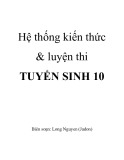

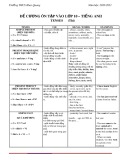

![Tài liệu ôn luyện Tiếng Anh vào lớp 10 [năm học]: Tuyển tập mới nhất, chuẩn nhất](https://cdn.tailieu.vn/images/document/thumbnail/2020/20200706/huywong98/135x160/9391594049485.jpg)

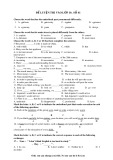
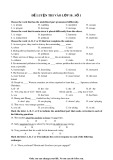




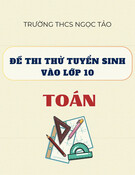
![Dàn ý và bài văn mẫu nghị luận xã hội ôn thi vào lớp 10: Tài liệu [mô tả/định tính]](https://cdn.tailieu.vn/images/document/thumbnail/2025/20250824/levanphuong15081979@gmail.com/135x160/23851756089220.jpg)
